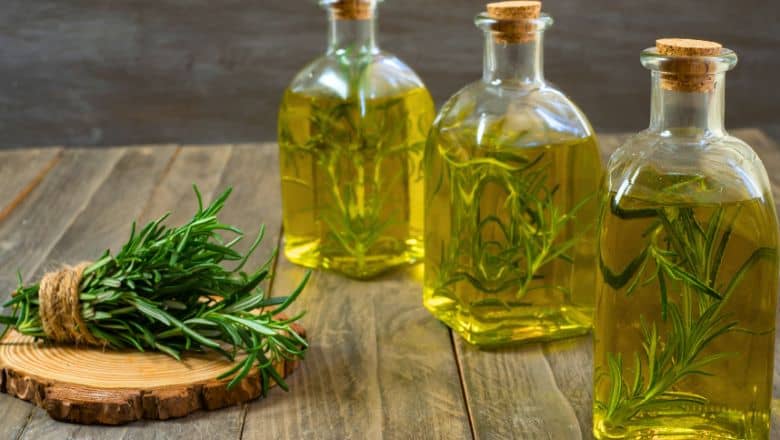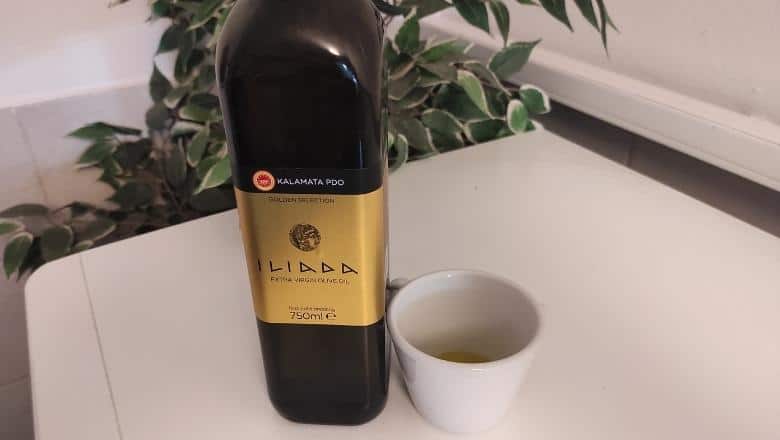How To Infuse Olive Oil With Your Favorite Herbs
Olive Knowledge is a part of Amazon Associates. As an Amazon Associate, we earn from qualifying purchases. Read our Affiliate Disclosure to learn more.
Olive oil has a fantastic taste, even if you take a sip of pure olive oil. But you can also play around with the taste of olive oil by infusing it with various herbs and spices.
In this post, I’ll show you my favorite way of infusing olive oil with herbs and spices. I’ve done that several times, and every time the result was a beautifully tasting olive oil that I can use in the kitchen.
Key Takeaways:
- Making infused olive oil at home involves a simple, rewarding process.
- Choose high-quality extra virgin olive oil; Greek, Spanish, or Turkish oils recommended.
- Popular infusion herbs include garlic, chili, citrus peels, cannabis, and Mediterranean herbs.
- Infused olive oil enhances flavor in dishes, especially as dressings and marinades.
- Homemade infused olive oil can last up to 12 months; dry ingredients extend shelf life.
What Is Infused Olive Oil?

Infused olive oil is simply olive oil that has absorbed the flavors and aromas of other ingredients, such as herbs, spices, or even fruits. Think of it as a flavor-enhancing elixir; the olive oil serves as a base, soaking up the essence of these added elements. This process transforms the oil into a unique culinary ingredient that carries the signature flavors you’ve chosen to incorporate.
Imagine drizzling garlic-infused olive oil over fresh bread or finishing a grilled steak with a splash of rosemary-infused oil. The possibilities are endless and entirely up to your taste. The beauty of infused olive oil lies in its versatility and the opportunity it offers for creative exploration in the kitchen.
How To Make Infused Olive Oil At Home

Creating your own infused olive oil at home is a simple, rewarding process. Here’s a basic guide for a cold approach that can be applied to any herb or spice you’d like to use.
- Select Your Olive Oil: I always recommend using high-quality extra virgin olive oil for infusions. Homemade olive oil from local farmers is an excellent choice if available. If not, olive oils from Croatia and Greece are my personal favorites, renowned for their exceptional quality and flavor profile.
- Clean Your Herbs or Spices: Thoroughly wash and dry your chosen herbs or spices. This ensures no unwanted particles end up in your infusion.
- Prepare the Jar: Use a clean glass jar with a tight lid. Make sure it’s sterilized to avoid any bacterial growth in your infusion.
- Place Your Herbs or Spices in the Jar: The amount you use depends on the intensity of flavor you desire. A good rule of thumb is to fill about one-third of the jar.
- Pour the Olive Oil: Fill the jar with your chosen olive oil, making sure all the herbs or spices are fully submerged.
- Seal and Store: Tightly seal the jar and store it in a cool, dark place. Let it sit for 10 to 15 days to allow the flavors to meld.
- Strain the Oil: Once your oil is infused to your liking, strain the oil to remove the herbs or spices. Use a fine-mesh strainer or cheesecloth for this.
- Store the Infused Oil: Pour your strained, infused oil into a clean, sterilized bottle. Store it in a cool, dark place. Here’s my guide on the best containers to store olive oil, so make sure to check that out.
Remember, the key to a high-quality infusion is starting with a high-quality olive oil. With this guide, you’re ready to create a delicious, personalized infusion that surpasses anything you’ll find on a store shelf.
As you can see above, I recommended using a cold approach. Some enthusiasts prefer the method of heating the olive oil and herbs together to speed up the infusion process. While this does yield a faster result, I personally don’t recommend this method. The heat can degrade the quality of the olive oil and significantly reduce the shelf life of your infusion.
I advocate for the patience and natural flavor development that comes with the cold infusion. This approach may take a bit longer, but the superior flavor and extended shelf life make it well worth the wait.
What Oil To Use To Make Infused Olive Oil

When it comes to making infused olive oil, the base oil you choose can significantly influence the final product’s flavor, health benefits, and overall quality. It’s important to choose wisely; in my experience, high-quality extra virgin olive oils are the best option.
Why?
Extra virgin olive oil is rich in antioxidants, particularly polyphenols, which are known for their numerous health benefits.
Among the diverse range of olive oils available in the market, here are my personal favorites:
- Greek Olive Oils: Known for their robust flavor and high polyphenol content, Greek olive oils add a layer of complexity to any infusion. They’re versatile, enhancing the flavor of any herb or spice you choose to infuse. (Check my Greek Olive Oil recommendation here)
- Spanish Olive Oils: Spanish olive oils are diverse in flavor profiles, ranging from fruity to bitter. This variety gives you plenty of options when deciding on the taste direction of your infusion. (Check my Spanish Olive Oil recommendation here)
- Turkish Olive Oils: Turkish olive oils are renowned for their unique, slightly pungent flavor. They pair well with strong, aromatic herbs and add a distinctive touch to your infusion. (Check my Turkish Olive Oil recommendation here)
Remember, the secret to a remarkable infused olive oil lies in starting with a quality base. With these recommendations, you’re well on your way to creating an infused olive oil that’s not only delicious but also rich in health benefits.
If you want to check the best olive oils worldwide, make sure to visit our shop, where we feature the best of the best. —-> Buy Olive Oil
What Are The Best Herbs To Make Infused Olive Oil

Selecting the right herbs for your infused olive oil can feel like an exciting adventure. While there’s no definitive answer, some herbs and ingredients have been widely embraced for their ability to complement olive oil’s rich, fruity flavor beautifully.
Most common herbs used for making infused olive oil:
- Garlic: One of the most popular choices, garlic lends a savory depth that pairs wonderfully with olive oil.
- Chili: For those who enjoy a kick, chili adds a fiery dimension that contrasts beautifully with the smoothness of olive oil.
- Citrus: Citrus peels, such as lemon or orange, impart a fresh, zesty note, creating a bright and vibrant infused oil.
- Cannabis: Cannabis-infused olive oil has gained popularity in recent years for its potential health benefits and unique flavor.
- Mediterranean Herbs: Basil, oregano, rosemary, and other Mediterranean herbs are traditional choices. Their aromatic profiles blend harmoniously with olive oil, making them a safe and delicious bet.
In the end, the choice of the herb is a personal one, guided by your individual taste. But these recommendations offer a starting point for anyone eager to embark on the journey of making infused olive oils. The ultimate goal is to enhance your culinary creations and elevate your dining experience, so keep that in mind.
What Is Infused Olive Oil Good For?
Infused olive oil serves as a versatile weapon in any culinary arsenal. Its primary function is to add an extra dimension of flavor to your dishes, but its applications in the kitchen are virtually limitless.
As a salad dressing, infused olive oil can transform a simple salad into an exciting flavor experience. The oil carries the aroma and taste of the herbs, infusing each bite with those flavors.
But where infused olive oil truly shines is in marinades. Marinating meat and fish in infused olive oil can profoundly enhance their flavor. I have a particular fondness for using my homemade infusions when marinating chicken and seafish, like sea bass. The oil penetrates the meat or fish, imparting the infused flavors and making every bite a delight, especially when grilling.
The personalized touch that infused olive oil lends to your dishes sets them apart from what you’d typically find in a restaurant. It’s a simple way to bring a unique, gourmet touch to your home cooking.
FAQ On Infused Olive Oils
Absolutely! Making infused olive oil at home allows you to customize flavors to your liking, making your dishes more personalized and unique. Plus, homemade infusions often have a fresher, richer taste compared to store-bought versions.
Infused olive oils, if they’re made from fresh olive oil and with a cold infusing method, can last up to 12 months if stored properly. Infused oils made with heat infusing method have a much shorter shelf life, usually up to 6 months if stored properly. But that’s all if you’re using dry ingredients. Using wet ingredients reduces the shelf life of flavored olive oils a lot.
The signs of infused olive oil going bad include cloudiness, discoloration, an off smell, and an unpleasant taste. Always trust your senses; if the oil looks, smells, or tastes off, it’s likely time to discard it.
Yes, it is possible to over-infuse olive oil. If too many herbs or spices are used, the oil can become overpowering. For beginners, I recommend starting with a smaller amount of herbs and spices and then gradually adjusting to your taste preference over time.
Absolutely, you should dry herbs before infusing them into olive oil. Wet ingredients can introduce moisture, which reduces the shelf life of your infused oil and may cause it to spoil rapidly. For ingredients like garlic, a quick roast before infusing can enhance the flavor and extend the oil’s shelf life. Using wet ingredients is possible, but you need to be extremely cautious, and the shelf life will be very short.
